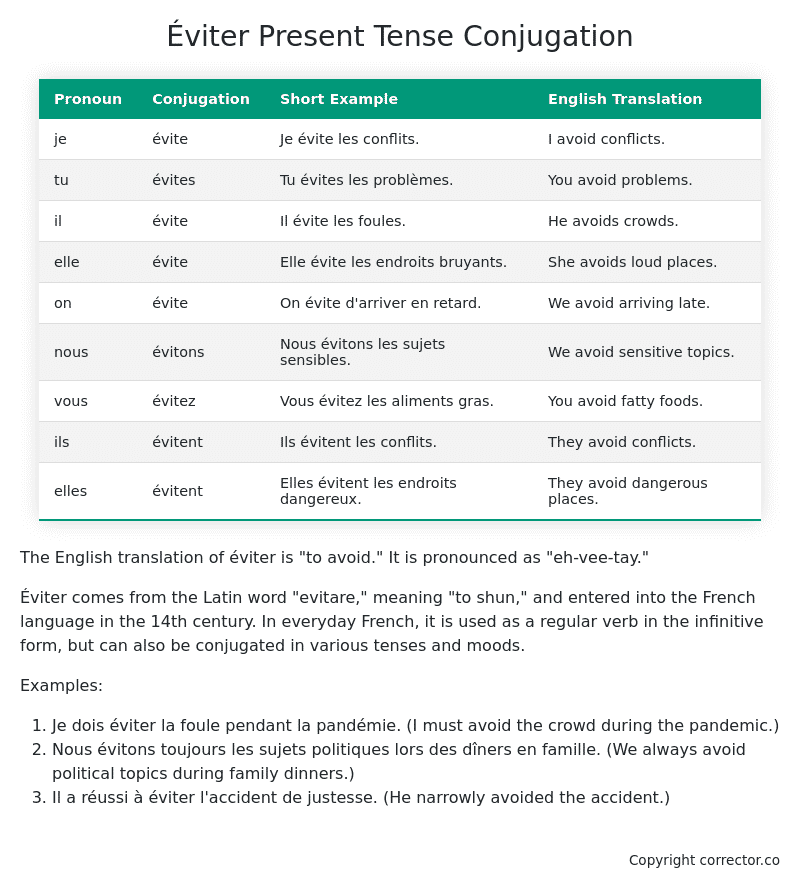Le Present (Present Tense) Conjugation of the French Verb éviter
Introduction to the verb éviter
The English translation of éviter is “to avoid.” It is pronounced as “eh-vee-tay.”
Éviter comes from the Latin word “evitare,” meaning “to shun,” and entered into the French language in the 14th century. In everyday French, it is used as a regular verb in the infinitive form, but can also be conjugated in various tenses and moods.
Examples:
- Je dois éviter la foule pendant la pandémie. (I must avoid the crowd during the pandemic.)
- Nous évitons toujours les sujets politiques lors des dîners en famille. (We always avoid political topics during family dinners.)
- Il a réussi à éviter l’accident de justesse. (He narrowly avoided the accident.)
Éviter – About the French Present Tense
To take a deep dive into all the French tenses then see our article on Mastering French Tense Conjugation.
Common Everyday Usage Patterns For Le Present
Interactions with Other Tenses
Table of the Present Tense Conjugation of éviter
| Pronoun | Conjugation | Short Example | English Translation |
|---|---|---|---|
| je | évite | Je évite les conflits. | I avoid conflicts. |
| tu | évites | Tu évites les problèmes. | You avoid problems. |
| il | évite | Il évite les foules. | He avoids crowds. |
| elle | évite | Elle évite les endroits bruyants. | She avoids loud places. |
| on | évite | On évite d’arriver en retard. | We avoid arriving late. |
| nous | évitons | Nous évitons les sujets sensibles. | We avoid sensitive topics. |
| vous | évitez | Vous évitez les aliments gras. | You avoid fatty foods. |
| ils | évitent | Ils évitent les conflits. | They avoid conflicts. |
| elles | évitent | Elles évitent les endroits dangereux. | They avoid dangerous places. |
Other Conjugations for Éviter.
Le Present (Present Tense) Conjugation of the French Verb éviter (this article)
Imparfait (Imperfect) Tense Conjugation of the French Verb éviter
Passé Simple (Simple Past) Tense Conjugation of the French Verb éviter
Passé Composé (Present Perfect) Tense Conjugation of the French Verb éviter
Futur Simple (Simple Future) Tense Conjugation of the French Verb éviter
Futur Proche (Near Future) Tense Conjugation of the French Verb éviter
Plus-que-parfait (Pluperfect) Tense Conjugation of the French Verb éviter
Passé Antérieur (Past Anterior) Tense Conjugation of the French Verb éviter
Futur Antérieur (Future Anterior) Tense Conjugation of the French Verb éviter
Subjonctif Présent (Subjunctive Present) Tense Conjugation of the French Verb éviter
Subjonctif Passé (Subjunctive Past) Tense Conjugation of the French Verb éviter
Subjonctif Imparfait (Subjunctive Imperfect) Tense Conjugation of the French Verb éviter
Subjonctif Plus-que-parfait (Subjunctive Pluperfect) Tense Conjugation of the French Verb éviter
Conditionnel Présent (Conditional Present) Tense Conjugation of the French Verb éviter
Conditionnel Passé (Conditional Past) Tense Conjugation of the French Verb éviter
L’impératif Présent (Imperative Present) Tense Conjugation of the French Verb éviter
L’infinitif Présent (Infinitive Present) Tense Conjugation of the French Verb éviter
Struggling with French verbs or the language in general? Why not use our free French Grammar Checker – no registration required!
Get a FREE Download Study Sheet of this Conjugation 🔥
Simply right click the image below, click “save image” and get your free reference for the éviter Present Tense tense conjugation!

I hope you enjoyed this article on the verb éviter. Still in a learning mood? Check out another TOTALLY random French verb present conjugation!


